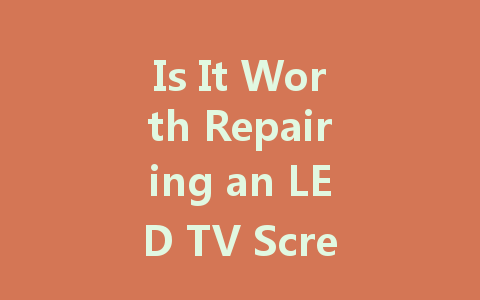
LED TVs have become an integral part of our lives, providing entertainment, information, and a connection to the world. However, like all electronics, they can sometimes experience issues, leading to the inevitable question: is it worth repairing an LED TV screen? This article will explore common problems, repair costs, and factors to consider when deciding whether to fix or replace your television.
Common Problems with LED TV Screens
LED TVs can face several issues, with screen damage being one of the most frequent. Here are some common problems:
Cracked or Broken Screens
Accidental drops, children playing with the remote, or a simple bump can lead to a cracked screen. Unfortunately, this type of damage can be costly to repair because the entire display unit often needs replacement.
Display Issues
Sometimes, you may notice problems like flickering, discoloration, or lines on the screen. These issues might stem from signal problems, faulty cables, or internal malfunctions rather than physical damage to the screen itself.
Backlight Problems
LED TVs use backlighting to make images visible. If the backlight fails, the screen can appear dark or completely black, which can be frustrating, especially when other components might still be functioning properly.
Repair Costs and Considerations
When faced with a malfunctioning LED TV, understanding the costs associated with repairs is crucial.
Cost of Screen Replacement
Repairing a cracked screen can be prohibitively expensive. Depending on the size and model of your TV, replacing the screen can cost anywhere from $200 to over $1,
Cost of Other Repairs
For issues such as display problems or backlight failures, repair costs can vary. Simple problems like loose cables or disconnected wires might only require a small service fee. However, internal repair jobs may also stretch into hundreds of dollars, depending on the technician and the specific issues affecting your device.
Age and Value of Your TV
Before deciding to repair your LED TV, consider its age and overall value. Here are key questions to help guide your decision:
How Old Is Your TV?
If your TV is several years old, it might be nearing the end of its lifespan. In such cases, investing in repairs may not yield a worthy return. Consider how well the TV has served you and whether newer models offer enhanced features such as better display quality or smart technology.
What Is the Replacement Cost?
Compare the repair costs with the market price of a similar new or refurbished TV. If you can find a decent-quality TV within the same price range as the repair, then replacing the TV may be the better option.
Warranty and Insurance Considerations
Before making a final decision, check if your TV is still covered by a warranty or if you have insurance policies that could cover repair costs.
Warranty Coverage
If your LED TV is still under warranty, contact the manufacturer or retailer to see what repairs are included. Some warranties cover screen damage or major repairs at no extra cost.
Homeowners or Renters Insurance
It might be worth checking if your homeowners or renters insurance covers electronic devices. Some policies include accidental damage, which could help offset repair costs.
DIY Repair vs. Professional Help
If you’re considering repairing your LED TV, you have the option to do it yourself or hire a professional.
DIY Repairs
If you’re tech-savvy and have some experience with electronics, you may opt for a do-it-yourself repair. Online tutorials and guides can help you troubleshoot issues and even replace certain components. However, this option can be risky, as mistakes may lead to further damage.
Hiring a Professional
For serious damage, particularly with the screen or internal components, hiring a professional is often the best choice. Professionals have the necessary skills and access to parts that can ensure a proper repair. While this may cost more upfront, it can save you from further complications down the line.
Conclusion
Deciding whether to repair an LED TV screen ultimately depends on various factors, including the nature of the damage, repair costs, the age of the TV, and warranty information. While minor issues might warrant a quick fix, significant damage, especially a cracked screen, could be best addressed by investing in a new television. Weigh the benefits and drawbacks carefully, and remember that a well-informed decision is always worth it in the long run. Whether you decide to repair or replace, ensuring a functioning TV is key to your viewing enjoyment.